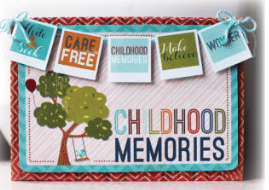CHILDHOOD MEMORIES
Most adults can’t remember what happened to them before age 3 or so. What happens to the memories formed in those earliest years? Francis Csedrik, who lives in Washington, D.C., is an eight-year-old boy. (1) ......................................... . There was the time he fell badly; the day someone stole the family car or the morning he found a black bat in the house. But Francis cannot answer when his mum, Joanne Csedrik, asks him about a family trip to the Philippines when he was 3. “It was to celebrate someone’s birthday,” she tells him. She also reminds him that they had a long flight. (2) ......................................... . Francis says he doesn’t remember. This is called childhood amnesia. “Most adults do not have memories of their lives for the first 3 to 3.5 years,” says Patricia Bauer, who is a professor of psychology at Emory University. When a child is younger than 4, their brain systems are still immature, Bauer says. “It doesn’t mean they’re not working at all,” she says. “But they’re not working as efficiently as in later childhood, and certainly in adulthood.” (3) ......................................... . Also if a memory has a good story with time and place, children can remember that too. Parents also play a big role in what a child remembers. If a parent helps the child put the memory in a story, it will not fade away. “I just like writing that story because I just don’t want to forget it,” Francis says. And stories become important for a different reason when you are an adult. That’s when people put together all of these smaller stories into a larger life story. (4) ......................................... .

